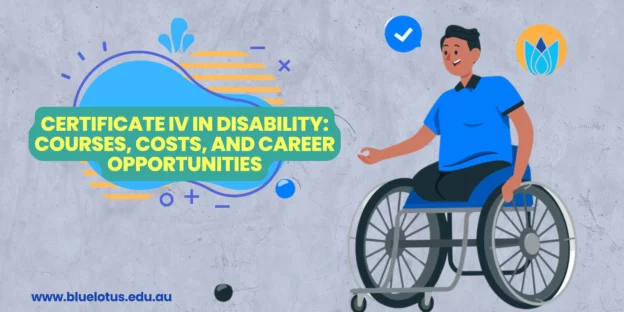In recent years, the demand for qualified professionals in the disability sector has grown significantly. With an increasing focus on providing quality care and support to individuals with disabilities, the need for well-trained disability support workers is more critical than ever. The Certificate IV in Disability Support is a qualification designed to equip individuals with the skills and knowledge necessary to work effectively in this field.
Learn more about the demand for disability support workers: www.myskills.gov.au/courses/details

What is Certificate IV in Disability?
The Certificate IV in Disability is a nationally recognized qualification in Australia, specifically tailored for those seeking to work in various roles within the disability sector. This course provides a comprehensive understanding of how to empower people with disabilities to achieve greater levels of independence, self-reliance, and community participation.
More details on Certificate IV in Disability: www.training.gov.au/Training/Details

Importance and Benefits of the Qualification
Obtaining a Certificate IV in Disability offers numerous advantages. Firstly, it prepares individuals to work in various settings, including residential group homes, training resource centers, day respite centers, open employment services, and other community settings. The skills acquired through this course ensure that graduates can provide personalized support, foster a respectful and inclusive environment, and contribute positively to the well-being of individuals with disabilities.

Types of Certificate IV in Disability Courses
There are several pathways and specializations within the Certificate IV in Disability, each tailored to different aspects of disability support and care. These may include:
- General Disability Support: Focusing on overall disability care, this course provides a broad understanding of working with people with disabilities.
- Community Services Specialization: This course is aimed at those looking to work in community-based roles, supporting individuals in integrating and participating in community life.
- Residential Care Specialization: Designed for those working in residential care settings, this course emphasizes the skills needed for supporting residents in daily living activities and healthcare needs.
Each specialization offers targeted skills and knowledge, ensuring graduates are well-prepared for their chosen career path.
Explore Certificate III in Individual Support In Melbourne at Blue Lotus College

Training and Course Options
The Certificate IV in Disability is offered through various modes of study, catering to the diverse needs of learners. Here are some of the popular options available:
Disability Training in Melbourne
Melbourne is home to numerous training institutions that offer the Certificate IV in Disability. These institutions provide a blend of classroom-based learning and practical placements, ensuring students gain hands-on experience in real-world settings. The courses in Melbourne are designed to meet industry standards and are often led by experienced professionals in the field.
Online Certificate IV in Disability Courses
For those unable to attend in-person classes, online courses provide a flexible alternative. These courses allow students to complete their studies at their own pace, making them ideal for individuals balancing work, family, or other commitments. Online courses still include practical components, often coordinated with local organizations to facilitate hands-on training.
Fast Track Options for Certificate IV in Disability
Fast-track courses are available for those who wish to complete their qualification in a shorter time frame. These intensive programs are designed for individuals who may already have experience in the sector or who are quick learners, allowing them to gain their qualifications faster and enter the workforce promptly.
Explore Helpful resource for Disability Support Course In Melbourne
Costs and Financial Considerations
Understanding the costs involved in obtaining a Certificate IV in Disability is crucial for prospective students. This section outlines the financial aspects and options available to help manage these costs.
Cost of Certificate IV in Disability Courses
The cost of a Certificate IV in Disability can vary widely depending on the institution and whether you’re eligible for government funding or subsidies. Here’s an updated breakdown of the fees:
- Tuition Fees: The general tuition fee for a Certificate IV in Disability ranges between AUD 2,300 to AUD 14,000. The lower end of this range typically reflects government-subsidized programs, while private or specialized institutions may charge higher fees.
- Additional Costs: Beyond tuition, students should consider other fees such as:
- Enrolment fees: Usually AUD 250 to AUD 500.
- Textbook and materials: Around AUD 100 to AUD 200.
- Practical placement fees: In some cases, institutions require fees for organizing practical training.
- Scholarships and Financial Aid: Some institutions offer scholarships or installment payment plans to help cover these costs.

Scholarships and Financial Aid Options
To assist with the costs, several scholarships and financial aid options are available to students. Many institutions offer scholarships based on merit, need, or specific criteria such as commitment to working in the disability sector. Additionally, government subsidies and loan schemes, such as VET Student Loans, may be available to eligible students, reducing the financial burden of the course.
International Students
Australia is a popular destination for international students seeking high-quality education and training in various fields, including disability support.
Explore Living and expenses In Melbourne
Certificate IV in Disability for International Students
International students are welcome to enroll in the Certificate IV in Disability courses. These courses provide a unique opportunity for students from around the world to gain valuable skills and knowledge in disability support, making them highly employable in both Australia and their home countries. Many institutions offer support services tailored to international students, ensuring a smooth transition and successful completion of their studies.
Explore Working Hours For International Students In Australia
Disability Support Worker Courses for International Students
International students can benefit from courses specifically designed to meet the needs of those intending to work as disability support workers. These courses not only cover the theoretical aspects but also offer practical training and placements, allowing students to gain real-world experience.

Course Duration and Structure
The duration of the Certificate IV in Disability typically ranges from 12 months to 2 years, depending on the mode of study and the student’s prior experience. The course structure generally includes a combination of classroom-based learning, online modules, and practical placements. These components ensure that students receive a well-rounded education, combining theoretical knowledge with hands-on experience.
Application Process
The process of applying for a Certificate IV in Disability is straightforward, but it’s essential to understand the requirements and prerequisites before starting.
How to Apply for a Disability Certificate
Prospective students can apply directly through the institution offering the course. Most institutions have online application forms that can be filled out easily. Applicants may need to provide personal details, educational background, and work experience. It is also advisable to check for specific deadlines and entry requirements before applying.
Entry Requirements and Prerequisites
Entry requirements for the Certificate IV in Disability may vary between institutions. Generally, applicants should have completed Year 10 or equivalent education. Some institutions may also require relevant work experience in the disability or community services sector. Additionally, international students must meet English language proficiency requirements, which may include IELTS or equivalent test scores.
Career Opportunities
Graduates of the Certificate IV in Disability can look forward to a variety of career opportunities in the disability sector.
Job Roles with a Certificate IV in Disability
Common job roles for graduates include disability support worker, personal care assistant, community support worker, and residential care officer. These roles involve providing direct care and support to individuals with disabilities, helping them achieve their personal goals and improve their quality of life.
Explore Aged Care and Disability Support Interview Questions and how to answer them
Graduate Certificate in Disability Support Worker
After completing a Certificate IV in Disability, graduates may choose to further their education with a Graduate Certificate in Disability Support Worker. This advanced qualification provides additional skills and knowledge, opening up higher-level job roles and career advancement opportunities.
Disability Support Worker Level 2 and Beyond
Progressing to Disability Support Worker Level 2 and beyond requires experience and additional training. Advanced positions may include supervisory roles, case management, or specialized support roles, such as working with individuals with complex needs.
Finding the Right Course
Choosing the right course and training provider is crucial for a successful career in the disability sector.
Disability Support Worker Courses Near You
Prospective students can find disability support worker courses by searching online for local training providers or institutions offering the Certificate IV in Disability. Many institutions have campuses in major cities, and online options are also available for those who prefer a more flexible learning approach.
Tips for Choosing the Best Training Provider
When selecting a training provider, consider factors such as the institution’s reputation, course content, practical placement opportunities, and support services for students. Reading reviews, talking to alumni, and attending open days can provide valuable insights into the quality of the course and the institution.

Conclusion
The Certificate IV in Disability is a valuable qualification that opens doors to a rewarding career in the disability sector. By understanding the various course options, costs, and financial aids available, prospective students can make informed decisions and take the first step towards a fulfilling career in disability support. Whether you choose to study in Melbourne, online, or through a fast-track program, the skills and knowledge gained will equip you to make a positive difference in the lives of individuals with disabilities.
Blue Lotus College, renowned for its comprehensive health care programs, offers a range of courses that cater to aspiring professionals in the health care and disability sectors. Their curriculum is designed to provide students with both theoretical knowledge and practical skills, ensuring graduates are well-prepared to meet the demands of the industry. With experienced faculty and state-of-the-art facilities, Blue Lotus College is committed to fostering the next generation of health care professionals who are equipped to deliver high-quality care and support.
For more information on the health care courses offered by Blue Lotus College, including Certificate IV in Disability and other health-related programs, please check the link: www.bluelotus.edu.au/faculty/health-care/






